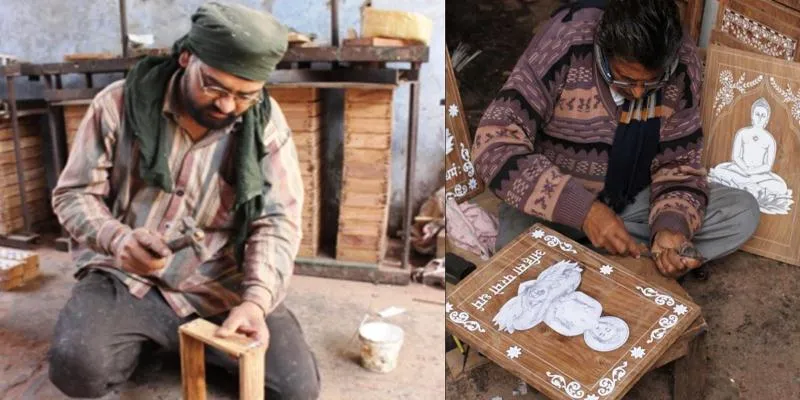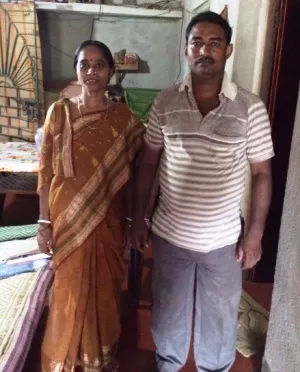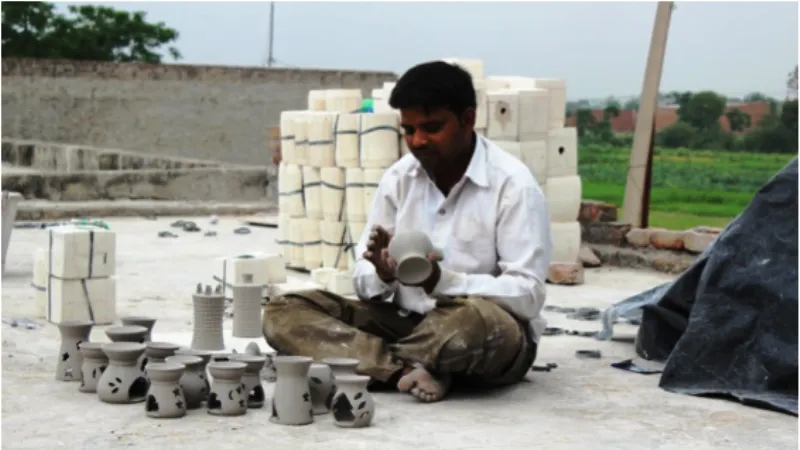SouvNear supports 10,000 Indian artisans by selling their products in 14 countries
The B2B startup is working towards providing artisans an organised market space where they can get a fair price for their products.

“People think that handicrafts are what you get at airport shops, the wooden horses and colourful bags. Those barely make one percent of what the handicraft industry has to offer,” says Harvinder Mavi (42), co-founder of SouvNear.
The B2B startup is working towards providing artisans an organised market space where they can get a fair price for their products.
Setting sail in startup waters
SouvNear was founded in 2013 by Harvinder, along with Gurmeet Walia (45), and Jagdeep Pannu (46).
Gurmeet noticed during his travels across India, that products sold by local artisans commanded a much higher price when sold in stores, whereas when sold independently in fairs or shops, they did not get the price they deserved.
This gave him the idea to tap into the handicrafts exports market of India and give the artisans a platform to sell. He got in touch with Harvinder and Jagdeep through mutual connections and SouvNear was born.
SouvNear currently buys products from artisans and exports them to buyers in over 14 countries. Working with over 10,000 artisans from across India, the social enterprise supports independent artisans as well as those associated with manufacturers and NGOs.

The company launched its B2B portal in September 2016. Before this, they sold the products through Amazon and other channels, with the help of subsidiaries they set up in the US and the UK.
The company has not raised any funds yet; the founders invested their own money and are trying to keep the burn rate as low as possible.
“When you start this out, it is a difficult market to carve. We wanted to give ourselves time to fix the processes and the supply chain, and then see where we were. If required, we may look at funding in the near future,” says Harvinder.
SouvNear does not market its products heavily and most of their onsite traffic is organic. 60-70 percent of the orders are repeat orders with the bulk coming from countries such as the US and the UK. Since it is a fragmented market in terms of demand, its target audience consists of small and medium university stores, wholesalers, and retailers.

Fixing the supply chain
Harvinder says that building the supply chain has been one of their biggest challenges. “That’s how it took us over three years to launch our website. From the supply side, there are layers and layers of middlemen. Therefore, what the artisan gets in the end is negligible,” says Harvinder.
He pointed out another problem where buyers are not able to build trust unless the products are associated with a brand. “How can a buyer from the US trust an artisan based in an Indian village and transfer a few thousand dollars into the artisan’s account?” he adds explaining the uncertainty about the delivery and quality of the products in this unorganised sector.
SouvNear has tried to fix this problem by improving its processes and building an efficient supply chain. “This is also the reason why we named our company SouvNear, to leverage the kind of faith people have in this word,” he adds. Gurmeet’s knowledge and travels have helped SouvNear identify its artisans in a meaningful way.
It was also not easy to get artisans to follow processes since most of them operate out of remote villages across state borders.
Earlier on, the artisans would conduct quality checks at the end of making their product; this would lead to delays in orders and substandard products. After a while, the team thought about building a uniform process, which was broken down into intervals.
To ensure processes are followed, SouvNear’s on field representatives keep a check on progress made by the artisans through these intervals. This makes sure that the product is of the best quality and is delivered to the buyer in the given time. Presently, SouvNear takes care of all the deliveries, which are made through shipping and air.
Gurmeet recalled the story of an artisan, Alak Jana (47) from West Midnapur in West Bengal. “When he started out, he would cycle to a cyber café to check if there were any orders. Today he has a phone, internet and an e-mail account,” says Gurmeet. Alak takes orders from them for six months starting February. For the remaining six, he goes around the country selling his products at fairs and festivals. Alak says that his business is always booming and he rarely sees a dip in demand for his products.

SouvNear’s future plans
In the next four-five years, SouvNear hopes to integrate Artificial Intelligence (AI) into their system, for keeping tabs on the quality of their products, so that monitoring the artisans is easier and requires less manpower. They are also working on an application that will enable the artisans to talk directly to the buyers in their vernacular, making communication easier and transparent.
What continues to strengthen the founding team’s conviction is the need for such a business. There is a $400 billion worth demand for handmade products worldwide of which India takes only two percent of the share. This is despite India being home to over seven million artisans (200 million according to unofficial sources). The artisan industry in India is already seeing its downfall due to loss of existing markets and the difficulty faced by artisans in catering to the emerging markets.
Harvinder points out the lack of awareness among buyers about the variety and kind of handicrafts produced in India. “The handicrafts industry is very unique, which is also one of its challenges. So many people don’t know about the products that are available. Therefore, the discovery itself does not happen,” he says.
Harvinder concludes by saying that India has immense potential in manufacturing since the material cost is lower in India than any of its competitions and there is abundance of resources available in terms of manpower. The bootstrapped startup wants to keep scaling up steadily by expanding their engagement with more artisans and bring in technology to expedite processes.







